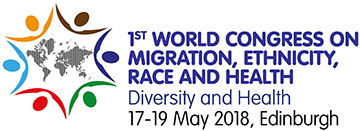MERH 2018 – Abstract Supplement
The MERH 2018 abstracts have been published in the European Journal of Public Health and are now available to view: Click here
Abstract and Workshop Submission are now CLOSED
The Scientific Committee welcomed the submission of abstracts for presentation at the 1st World Congress on Migration, Ethnicity, Race and Health (MERH 2018), Edinburgh, UK. The Congress will provide a unique opportunity for participants to meet, share their knowledge and experience, and discuss the issues in this important and topical field. We look forward to receiving contributions from around the world in order to ensure a true global perspective on our theme.
Abstracts were invited for individual oral or poster presentations in the following categories:
- Legislation, Policy and Practice
- Research
- Training and Education
- Or: abstracts for workshops embracing one or more of the categories above.
Abstracts can address any of the following groups or topics. Other groups and topics relevant to migration, ethnicity, race and health are also welcome for consideration.
Abstract & Workshop Submission Key Dates
| Deadline | Date |
|---|---|
| Opening Date for Submissions | 3pm (BST) 3rd July 2017 |
| Closing Date for Submissions EXTENDED | 10am (BST) 12th October 2017 |
| Notification to Authors of Outcome | 11th December 2017 |
| Authors registered by | 3rd February 2017 |
Groups
Migrants, including asylum seekers, refugees and internally displaced people; ethnic or racial minorities or groups including indigenous peoples and faith groups.
Suggested topics
- The origin and use of terms such as ethnicity and race
- Definition, categorisation and recording of migration status, ethnic group or race for health purposes
- Theories and hypotheses arising from observations of differences in health, related to migration, ethnicity or race
- The effects of population mixing and intermarriage on the study of health-related differences
- The role of genetics in the health of migrants or other groups
- Diversity in health-related beliefs, attitudes and behaviours, and their implications
- Discrimination, social exclusion and marginalization and their impact on health
- The comparative health and well-being of migrants or other groups, including mental health
- Intergenerational relations and generational changes in health following migration and their implications
- Understanding the interaction between migrant status, ethnicity or race and other health-related characteristics including economic circumstances, educational attainment, and diverse sexual and gender identities
- What can we learn from racial or ethnic health differences regarding other health inequalities or disparities?
- International or national legislation, policies or services and their implications for the health and wellbeing of migrants or other groups
- Evidence and actions to inform or influence legislative, policy or practice changes relevant to the health of migrants or other groups; barriers and facilitators
- The economics of healthcare provision for migrants or other groups
- Description and evaluation of the health consequences of working conditions for migrants or other groups
- The involvement of migrants or other groups in health-related research including recruitment and retention issues
- Access to and quality of healthcare services: identifying and addressing disparities and inequalities
- Access to and quality of healthcare services for migrants in transit, on arrival or in detention
- Development, adaptation and evaluation of relevant health-related interventions
- Health system responsiveness to diversity: development of good practice, professional training and education
- The effects of health status and healthcare services on social integration
- The consequences of international migration of health professionals for countries of origin and destination
- Ethical issues in relation to any of the above
Review process
Abstracts will be selected following careful review by the Scientific Committee, using the criteria described below. In determining the final selection, the Committee will consider the need for representation of work from all parts of the world and across different topics. Presenting authors will be notified of the acceptance or rejection of their abstracts by 04/12/17. The decision of the Scientific Committee will be final.
Presentation Formats
Abstracts will be considered for individual oral or poster presentations, or workshops. Authors must indicate which type of presentation they would prefer.
Oral presentations: Following acceptance, authors will be given clear instructions regarding the length of their presentation and the time reserved for discussion, where and when the presentation will take place and detailed guidance on preparing suitable slides.
Poster presentations: Posters will be displayed on interactive electronic screens. Following acceptance, authors will be given detailed instructions on how to prepare their posters and where and when they will be expected to present and discuss their work.
Terms and conditions
By submitting an abstract, an individual presenting author agrees to the following statement: “If my work is accepted, I plan to attend the 1st World Congress on Migration, Ethnicity, Race and Health, or if I am unable to attend, to agree a nominated substitute and to communicate the change to the conference secretariat.”
If the abstract is accepted, the presenting author must register for the conference in order to give the presentation. If he or she, or a nominated substitute, have not registered by 03/02/2018, the abstract will be removed from the programme and the abstract book.
Presenters or panelists in workshops must also register for the conference by 03/02/2018.
